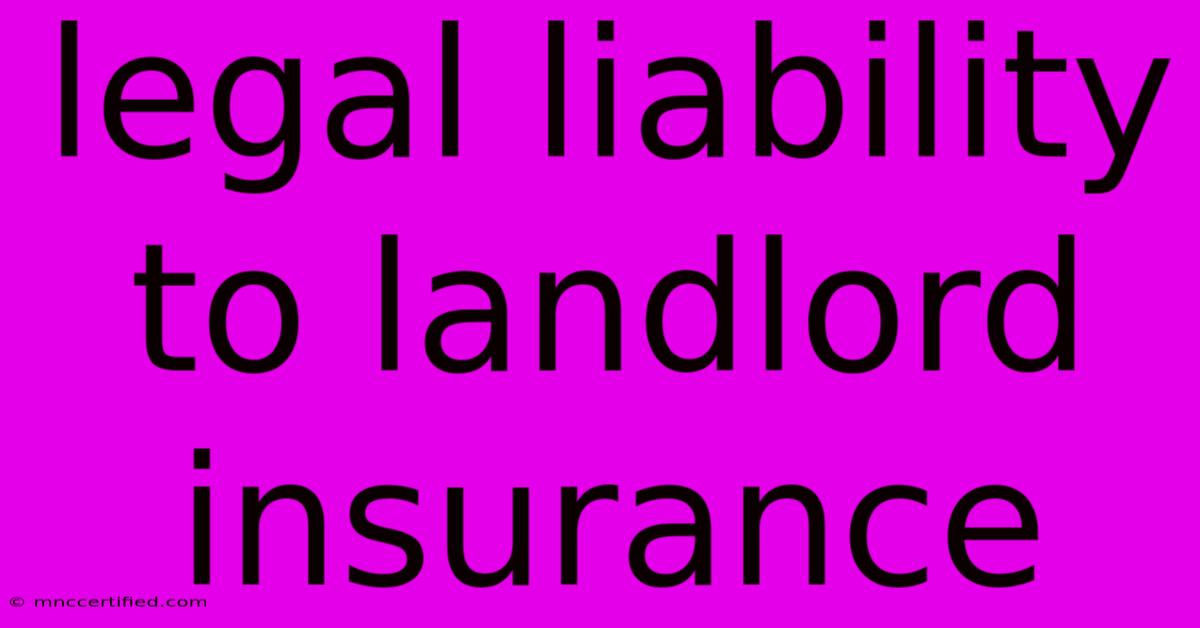Legal Liability To Landlord Insurance

Table of Contents
Landlord Insurance: Navigating the Complexities of Legal Liability
Owning rental properties can be a lucrative investment, but it also comes with inherent risks. One of the biggest concerns for landlords is legal liability, and this is where landlord insurance plays a crucial role. Understanding your liability and the coverage offered by landlord insurance is essential for protecting your financial interests and ensuring peace of mind.
What is Landlord Liability?
Landlord liability refers to the legal responsibility you hold as a property owner for any injuries or damages that occur on your rental property. This liability can stem from a variety of situations, including:
- Negligence: Failure to maintain the property in a safe condition, leading to accidents or injuries.
- Breach of contract: Failing to fulfill the terms of the lease agreement, such as providing essential utilities or addressing repairs.
- Trespassing: Injuries occurring on your property due to unauthorized access.
- Tenant actions: Accidents or damages caused by tenants, even if unintentional.
Why is Landlord Insurance Important?
Landlord insurance provides crucial financial protection against these potential liabilities. It helps cover expenses related to:
- Property damage: Repairs or replacement of damaged property due to accidents, vandalism, or natural disasters.
- Personal injury: Medical expenses, legal fees, and settlements for injuries sustained by tenants or others on the property.
- Loss of rental income: Compensation for lost income if the property becomes uninhabitable due to a covered event.
- Legal defense: Coverage for legal fees and expenses in defending yourself against lawsuits related to property damage or personal injury.
Types of Landlord Liability Coverage
Landlord insurance policies typically offer various types of liability coverage, including:
- General Liability: Covers injuries and damages that occur on the property, regardless of fault.
- Tenant Liability: Protects you from liability arising from tenant actions, even if you are not at fault.
- Medical Payments: Covers medical expenses for injuries sustained by tenants or guests, regardless of fault.
- Personal Injury Liability: Protects you from lawsuits alleging libel, slander, or wrongful eviction.
Key Considerations for Landlord Insurance
When choosing landlord insurance, it is crucial to consider the following factors:
- Property type and value: The type and value of your rental property will influence the level of coverage you need.
- Rental income: Consider the amount of rental income you generate to ensure adequate coverage for lost income.
- Number of units: If you own multiple units, you may need higher liability limits and specific coverage for each unit.
- Tenant history: Past tenant issues or high-risk tenants may necessitate additional coverage.
- Local regulations: Familiarize yourself with local laws and regulations that may impact your liability.
Protecting Yourself and Your Investment
Investing in adequate landlord insurance is a crucial step towards protecting your financial well-being and securing your investment. By carefully considering your specific needs and researching different policy options, you can choose the right insurance to effectively mitigate your liability risks and ensure a secure future as a landlord.
Disclaimer: This article is for informational purposes only and does not constitute legal or financial advice. Consult with a qualified insurance agent or legal professional for personalized advice regarding your specific circumstances.

Thank you for visiting our website wich cover about Legal Liability To Landlord Insurance. We hope the information provided has been useful to you. Feel free to contact us if you have any questions or need further assistance. See you next time and dont miss to bookmark.
Featured Posts
-
Asia Qualifiers Nepal Takes On Thailand In U 19 Womens T20
Nov 10, 2024
-
Ferrous Processing And Trading Co Miami
Nov 10, 2024
-
Does Insurance Cover Lipedema Surgery
Nov 10, 2024
-
Trading In A Car With Engine Problems
Nov 10, 2024
-
Clemson Roster Update Defender Absent
Nov 10, 2024